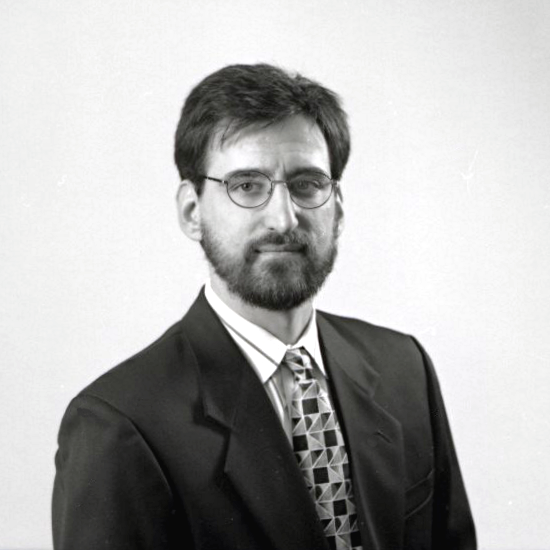Faculty 2012
Our lecturers are hand picked for their in-depth expertise and ability to convey their experiences to maximise the learning experience of our delegates. They also are friendly, approachable and able to have a good laugh! The intensive, yet informal, atmosphere at the XML Summer School gives delegates the opportunity to pick the brains of our expert faculty, both during the classes and afterwards over dinner or in the bar.
Faculty Board members also teach.
- Adam Retter

Adam Retter is co-director of eXist Solutions GmbH, which provides support and consultancy for the open source eXist Native XML Database and web platform. With over a decades experience in building online web applications, having started with Perl, CGI, and C++ ISAPI moving up through to .NET, PHP and J2EE, today he is much happier doing the same using XQuery, XSLT and XForms.Adam is an invited expert on the W3C XQuery Working Group, where he focuses on representing the Open Source communities interests and advancing XQuery for complete web application development.
Adam is a strong proponent of XML Application Server architectures, where entire applications are built in XML technologies and power enterprise scale end-to-end XML and XRX Applications. To further standardise XML application development, Adam founded the EXQuery project in early 2009 and has since been working with the community and as part of the EXPath project to standardise and improve XML application development with XQuery, XSLT and XPath.
Adam’s homepage is at http://www.adamretter.org.uk.
- Alistair Miles

Alistair Miles is a member of the informatics team at the Centre for Genomics and Global Health, based at the Wellcome Trust Centre for Human Genetics in Oxford. He is involved in the design and development of Web-based systems for MalariaGEN.
Alistair joined the Kwiatkowski group in 2009. Prior to that, he worked for the Science and Technology Facilities Council’s e-Science Centre, and for the Zoology Department, University of Oxford, primarily on the development and application of Web standards for sharing and linking of scientific data.
- Dr. Andy Seaborne

Andy has been working on the storage and query of RDF data, first as a researcher at HPLabs, and now at Epimorphics.Andy is continuing his participation in the SPARQL standardization process. He started as a member of the W3C RDF Data Access Working Group and is a member of the current W3C SPARQL Working Group. Andy co-edits the query language specification and lead the proposal submission for SPARQL Update and is a member of the W3C RDF Working Group.He also works on Apache Jena, an open source RDF framework for Java, where he contributed the query engine, ensuring that complete implementations of the standards are available, and several persistent storage sub-systems.
Andy has a PhD in Computer Science from the Computer Laboratory at the University of Cambridge.
- Debbie Lapeyre

Ms. Lapeyre has been working with XML, XSLT, and XPath since their inception and with SGML (XML’s predecessor) since 1984. Debbie is an architect and developer of XML Tag Sets (vocabularies) who designs and writes the schemas (DTD, XSD, RELAX NG) that model those vocabularies. Most recently, she serves as the architect and as a member of the design team for the NLM Journal Archiving and Interchange Tag Suite, now the de facto standard for tagging journal articles worldwide.As a document-oriented publishing analyst, Debbie helps clients to analyze their information management, retrieval, and distribution/publication requirements and translates these requirements into functioning production systems, based on XML technologies. As a senior XSLT and XSL-FO consultant for Mulberry Technologies, Inc., she designs both pages and specifications for complex XSLT transforms and stylesheets as well as develops prototype XSLT applications.Debbie is a member of the XML Guild. She is also a co-chair of “Balisage: The Markup Conference” and has previously co-chaired “Extreme Markup Languages”, “Markup Technologies”, and the annual international “SGML/XML’XX Conference”. She teaches XML, XSLT, XSL-FO, Schematron, What-is-XML-and-Why-Should-You-Care, and XML print workflows at venues all over the English-speaking world.
- Eric van der Vlist

Eric is an independent consultant and trainer. His domains of expertise include Web development and XML technologies. He is the creator and main editor of XMLfr.org, the main site dedicated to XML technologies in French, the author of the O’Reilly animal books on XML Schema and RELAX NG and was a member of the ISO DSDL (http://dsdl.org) working group focused on XML schema languages. He lives in Paris and you can reach him by mail (vdv@dyomedea.com) or meet him at one of the many conferences where he presents his projects.
- Florent Georges
-
Florent Georges is the founder and CTO of H2O Consulting. He has been involved in the XML world for 10 years, especially within the XSLT and XQuery communities. He is an invited expert in the XSL working group at W3C. His main interests are in the field of XSLT and XQuery extensions and libraries, packaging, unit and functional testing, and portability between several processors. Since the beginning of 2009, he has worked on EXPath, to define “standard” extension function libraries that can be used in XPath (so in XSLT, XQuery and XProc as well).
Florent’s website is at http://h2oconsulting.be/.
- Gary Cornelius

Gary Cornelius is an experienced XML consultant and information architect, working for Reed Elsevier Technology Services. Gary has been an active contributor to XML mailing lists and standards for over a decade and enjoys technical project management involving XML. He has developed several XML and web related training courses for IT engineers and managers. Interested in data visualisation and usability, he has investigated many tools and techniques for visualization of complex XML data. Gary has both broad knowledge and hands-on experience of XML having worked across many market sectors on XML information architectures. He studied publishing, graphic communication management, and digital imaging.
- Graham Klyne

After obtaining a degree in Applied Mathematics, Graham Klyne has been a software developer for many years, working on a variety of applications from scientific measurement to industrial process control, currency trading networks to engineering design software, and points between. Along the way, he has learned a variety of software skills from programming early microprocessors in machine code and C to semantic web applications in Python and Haskell. He has also contributed to several Internet and Web standards, including the specifications for RDF, and is currently working at Oxford University on using semantic web technologies and more for managing research data.
- Dr. Jeni Tennison

Dr. Jeni Tennison is an independent consultant. She specialises in XSLT and XML schema development with forays into AJAX and RDF. She trained as a knowledge engineer, gaining a PhD in collaborative ontology development, and since becoming a consultant has worked in a wide variety of areas, including journal publishing, medieval manuscripts, legislation and financial services. She is author of several books including “Beginning XSLT 2.0” (Apress, 2005).Jeni was an invited expert on the W3C’s XSL Working Group during the development of XSLT 2.0 and was one of the founders of the EXSLT initiative to standardise extensions to XSLT and XPath.
- Jo Rabin

Jo is CTO at Sponge Group as well as being Director of Mobile Monday
London and The Mobile Academy. He is a Chartered Engineer.His experience includes being CTO at dotMobi, Flirtomatic and at
Reuters Mobile. While at Reuters, Jo developed the first version of the
news industry interchange standard, NewsML and was responsible for the
development of the Reuters foreign exchange dealing system. Before
that he helped start the UKs first public electronic mail system,
Telecom Gold.Jo’s currently co-chair of the W3C Coremob Community Group which is
chartered to accelerate the adoption of the mobile Web as a compelling
platform for the development of modern mobile Web applications. From
2005 to 2010 he co-chaired the W3C Mobile Web Best Practices Working
Group. He wrote and edited many W3C mobile Web related Recommendations
and Notes and various other publications.- Leigh Dodds

Leigh Dodds is a freelance consultant specialising in Open and Linked Data. Leigh Dodds has significant experience working with Semantic Web and Web technologies in many different roles and is passionate about the web, open standards and open data. Leigh was responsible for technical and product strategy around Talis’s data hosting and publishing products, as well as launching their Linked Data consulting services. He has written about and spoken widely on a range of semantic web topics, including SPARQL, Linked Data, managing and aggregating data on the web, and building semantic web applications.
- Dr. Marc Hadley
-

Dr. Marc J. Hadley is a Principal Engineer with the Mitre Corporation, a not-for-profit organization that performs research and development for the United States Federal Government. Since joining MITRE, Marc has worked on a variety of healthcare-oriented projects including popHealth (a system for measuring clinical quality) and hQuery (a system to support large scale distributed queries of health information).
Prior to joining MITRE, Marc was a Java and Web Services Architect at Sun Microsystems where he lead the development of JSRs for RESTful and SOAP-based Web services. Marc also represented Sun in several standards groups at both the W3C and WS-I.
- Matt Patterson

Matt Patterson has over 10 years experience building for the web, from web design and front-end development all the way through to back-end development. Along the way he’s co-written a book on CSS, which is currently in its second edition and has been translated into Italian and Spanish, led a software team at the BBC, and spent five of the last ten years running design- and development-focussed consultancies. He was also a co-organiser of the NoSQL Europe conference.
His consultancy is Constituent Parts.
- Norman (Norm) Walsh

Norman Walsh is a Lead Engineer at MarkLogic Corporation where he works with the Application Services team. Norm is also an active participant in a number of standards efforts worldwide: he is chair of the XML Processing Model Working Group at the W3C where he is also co-chair of the XML Core Working Group. At OASIS, he is chair of the DocBook Technical Committee.With almost twenty years of industry experience, Norm is well known for his work on DocBook and a wide range of open source projects. He is the author of DocBook: The Definitive Guide.
- Paul Downey

Paul Downey is a Technical Architect with the Government Digital
Service, building Gov.UK. Formerly he was a member of Osmosoft, a small Open Source Innovation team at BT, where he contributed to a number of Open Source projects, notably TiddlyWiki. He participated in the standardisation of XML and Web services at the W3C, WS-I and OASIS. Paul likes to evangelise the value of REST and the Web through code, presentations and uber-doodles such as the mildly notorious The Web is Agreement.- Sebastian Rahtz

Sebastian Rahtz is Director (Research) of Academic Support, IT Services, University of Oxford and he oversees the teams responsible for web, mobile apps, help desk, IT staff liaison, and development projects. He has been closely associated with the Text Encoding Initiative for the last decade as a member of its Technical Council, architect of its revised metaschema system, and author of a library of XSL transforms for TEI documents (including the Guidelines documentation and its schemas). Since 2008 he has been part of the team developing CLAROS (“the world of ancient art on the semantic web”) at Oxford, for which he leads the Metamorphoses sub-project which to manage its place and name linking. He is a bigot for open source, XML, TEI, XSL and (latterly) RDF and linked data.
Sebastian has a degree in Classics and Modern Greek from Oxford and an MA in Archaeology from London. He worked as a field archaeologist, was a computer science lecturer at Southampton (where he was an early teacher of humanities computing, and archaeological computing), and had a stint as publication methods specialist for Elsevier Science. He spent much of the 1990s in the world of the TeX typesetting system.Sebastian has co-authored two books on TeX, edited many sets of conference proceedings, written many articles, is the author of a slew of TeX- and TEI-related software, has presented at many archaeological computing, TeX and XML conferences, and taught practical courses around the world.
- Tom Scott

Tom Scott is a digital product manager with extensive experience of delivering innovative Web project. Tom was an early adopter of both the Web (he published his first Web page in 1994) and Semantic Web technologies (publishing his first RDF in 2000) Tom continues to deliver Web sites, across both the private and public sector, targeted to user and business needs combining detailed technical knowledge and editorial leadership.
Tom currently works as the Head of Platform in the nature.com team where he is responsible for NPG’s core Web publishing activities – including search, mobile apps, developer programme, user registration and article improvement.
Prior to joining NPG Tom worked for the BBC where he has executive responsibility for the BBC’s nature site (bbc.co.uk/nature) incorporating a major Linked Data and video publishing element (bbc.co.uk/nature/wildlife). Prior to this he managed the deliver of the BBC’s programme support site (bbc.co.uk/programmes) a Web site that publishes a page for every programme the BBC broadcasts and the BBC’s music site (bbc.co.uk/music) a Web site, integrated into the BBC broadcast systems and BBC Programmes. All three sites are often held up as exemplary projects within the Linked Data community.
Tom regularly speaks at international conferences on Linked Data, Web publishing and Domain Driven Design; including the Web’s 20th birthday celebrations at CERN in 2009 (http://info.cern.ch/www20/).
- Tony Graham

Tony Graham is an independent consultant who has been working with markup since 1991, with XML since 1996, and with XSL/XSLT since 1998. He is an invited expert on the W3C Working Group defining the XSL FO specification, an acknowledged expert in XSLT, developer of the open source xmlroff XSL formatter, a committer to both the XSpec and Juxy XSLT testing frameworks, the author of “Unicode: A Primer”, a member of the XML Guild, and a qualified trainer.
Tony’s career in XML and SGML spans Japan, USA, and Ireland, working with data in English, Chinese, Japanese, and Korean, and with academic, automotive, publishing, software, and telecommunications applications. He has also spoken about XML, XSLT, XSL FO, EPUB, and related technologies to clients and conferences in North America, Europe, and Australia.